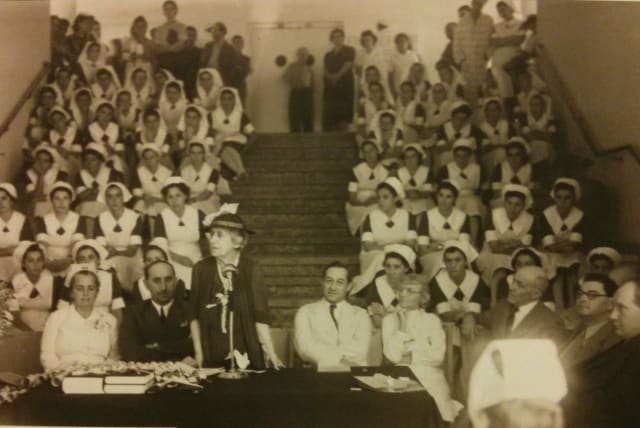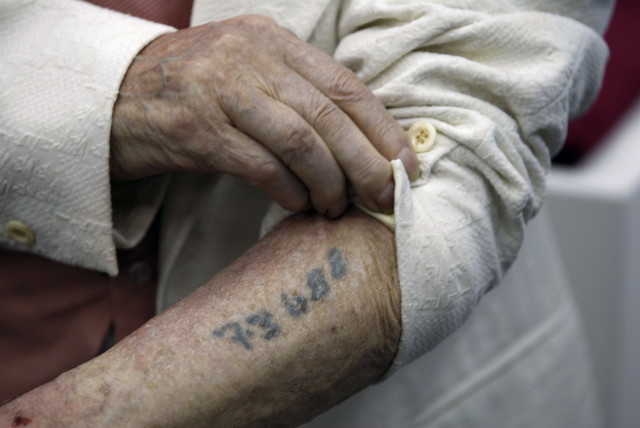Holocaust survivors: When the abused become healers - opinion

It’s easily noticeable that so many of the doctors and nurses I work with at Hadassah Medical Organization are the sons and daughters of Holocaust survivors.
“If you had a childhood of privation like theirs [the Palestinians’], or if your parents did, you’d want revenge. How can you blame them?”
Assuming his preferred pedagogical posture, that’s what the professor from University of California Berkeley told me from across the dinner table.
This conversation goes back years but returns frequently: a flashback to a dinner replete with dyspepsia.
Ironically, we were attending a conference in Japan, espousing prayers for world peace. My husband, Gerald Schroeder, was the invitee because of his demonstrating the confluence between Bible and science. He could bring me as his plus one.
The organizers may have regretted it.
“I question your supposition,” I said, endeavoring to maintain a matter-of-fact tone while the fires were already raging in my gut. “I’m sure you’ll agree that the Jews underwent the most extreme privation and abuse in the Holocaust. Nonetheless, those who survived and their children – the second generation – have tended to go into healing and helping professions more than the rest of us.”
The professor’s eyes bulged, and he flushed red as the beets in the vegan entrée. Our conversation was strained after that.
Holocaust survivors and becoming healthcare workers
I’ve been thinking a lot about that encounter at the foot of majestic Mount Fuji, in these troubled times as we approach Holocaust Remembrance Day, Yom Hashoah, with campuses erupting and echoing those dinner table platitudes and far worse.
Indeed, the record of Holocaust survivors belies his [the professor’s] excuse for terrorism. It’s easily noticeable that so many of the doctors and nurses I work with at Hadassah Medical Organization are the sons and daughters of Holocaust survivors.
Just as Jewish physicists fleeing Nazi Europe – not just Albert Einstein – contributed to America’s ability to develop a nuclear program, doctors and nurses dismissed from the great research institutes, hospitals, and public health programs of Europe played a key role in Israeli medicine. An estimated 15% of the doctors in Nazi-occupied countries were Jews. Among pediatricians in Germany, the number is sometimes estimated as high as 50%.
After the Law for the Restoration of the Professional Civil Service went into effect on April 7, 1933, Jewish physicians lost their jobs in the public health sector. Soon after, they were stripped of their medical licenses, while 50% of their former German colleagues joined the Nazi party.
The lucky ones got out on time. Take the late Prof. Bernard Zondek, who served as chief physician of obstetrics and gynecology at the municipal hospital of Berlin-Spandau. Together with Jewish pathologist Paul Aschheim, he developed the first reliable pregnancy test in 1928. But five years later, the notice of his dismissal was delivered by Nazi storm troopers. By 1934, he was treating patients in Jerusalem.
In 1939, my friend Judith Steiner-Freud managed to leave Czechoslovakia on a student certificate to study at Hadassah’s School of Nursing. You can see her in an often-reproduced historic photo with Henrietta Szold. She looks miserable. Now 104, she says she was grieving for her family left behind. She eventually headed the nursing school and introduced academic nursing to Israel.
Among survivors who arrived in Israel after the war was Italian Chana Cassouto, who survived her husband’s murder and Auschwitz. She was reunited with her children, who were in the care of her father-in-law, the great scholar Rabbi Umberto (Moshe David) Cassouto. She joined the Hadassah research staff on Mount Scopus, opened in 1939. Tragically, she was among the 78 staff and patients murdered in the attack on the Hadassah medical convoy massacre on April 13, 1948.
THE SECOND generation – children born to Holocaust survivors – also favored helping professions. To name just a few I know from Hadassah Hospital, there’s renowned trauma surgeon Prof. Avi Rivkind, who lit a torch last year on Independence Day, the only child of two survivors from Poland. Dr. Rely Alon, director of the Nursing Division and Health Professions, says her mother’s resilience was a prime factor in her decision to become a nurse. a midwife, and a leader.
There’s Head of Urology Ofer Gofrit, whose mother wrote the internationally heralded book I Wanted to Fly Like a Butterfly, based on her experience hiding in a Warsaw closet in Poland. Nurse-educator and expert on sexuality Dr. Anna Woloski Wrubel, Prof. Chaim Lotem, former head of cardiology, and Prof. Iri Liebergall, head of orthopedics, are children of survivors. Hadassah Director-General Yoram Weiss and Medical School Dean and head of the committee to choose medicines for the Israeli health basket hematologist Prof. Dina Ben-Yehudah are both from Holocaust backgrounds.
One theory is that they reacted to passed-down trauma. But here’s another explanation. In 2002, in the Second Intifada with its recurrent terror attacks, British MP Jenny Tonge (later a baroness and member of the House of Lords) came to Israel with the BBC after she said about Palestinian suicide bombers: “If I had to live in that situation – and I say that advisedly – I might just consider becoming one myself.”
After Tonge’s meeting a nurse whose daughter was murdered in the Sbarro pizzeria, and a bus bombing victim who lost the use of her arm, I introduced her to – now professor – Dr. David (Dubi) Zangen, head of Hadassah’s pediatric endocrinology. Zangen served as chief medical officer for the IDF in Jenin during Operation Defensive Shield and was a debunker of the lies told about the battle of Jenin. (You can still access his article “Seven Lies About Jenin” online.) Jenin parents saw him and asked if they could bring their children for a check-up. Maj. Zangen wound up opening a clinic while he was stationed there.
MP Tonge asked Dr. Zangen “if he really couldn’t understand the Palestinians and their intifada.”
He shook his head. “My Palestinian patients may have some difficulties getting here because of security roadblocks. If they’re hungry after their journey, they get a tray of food from the hospital kitchen. My grandparents, from Holland, were gassed in Auschwitz. My parents – my mother is a doctor herself – never told us to strap on an explosive belt and blow ourselves up in Berlin. They always said there was a choice in life: to destroy or build the world. I suggest that you recruit a cadre of the smartest Palestinians and send them to study all the fields they need to build a just and healthy society.”
Tonge said that sounded like a good idea. Not that she became Zionist, but at least she listened.
Modestly, Zangen didn’t mention that his parents’ advice paid off. One of his brothers is also a physician, another a brain researcher, and his sister is a lawyer. “My parents said that the only revenge they cared about was seeing their children doing good [deeds] and contributing to a flourishing Israel.”
The writer is the Israel director of public relations at Hadassah, the Women’s Zionist Organization of America. Her latest book is A Daughter of Many Mothers.
Jerusalem Post Store
`; document.getElementById("linkPremium").innerHTML = cont; var divWithLink = document.getElementById("premium-link"); if (divWithLink !== null && divWithLink !== 'undefined') { divWithLink.style.border = "solid 1px #cb0f3e"; divWithLink.style.textAlign = "center"; divWithLink.style.marginBottom = "15px"; divWithLink.style.marginTop = "15px"; divWithLink.style.width = "100%"; divWithLink.style.backgroundColor = "#122952"; divWithLink.style.color = "#ffffff"; divWithLink.style.lineHeight = "1.5"; } } (function (v, i) { });

